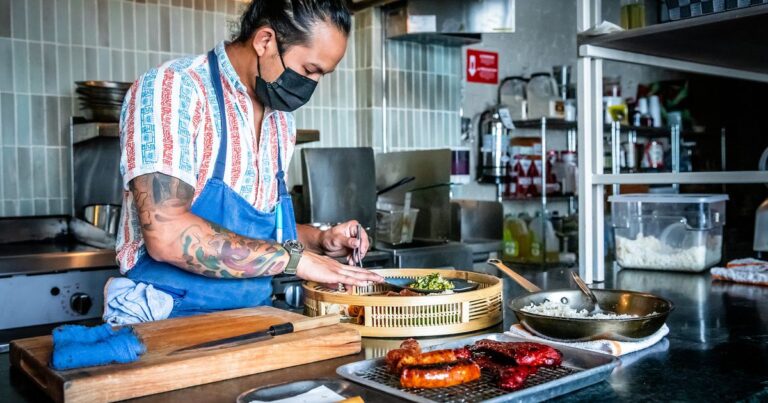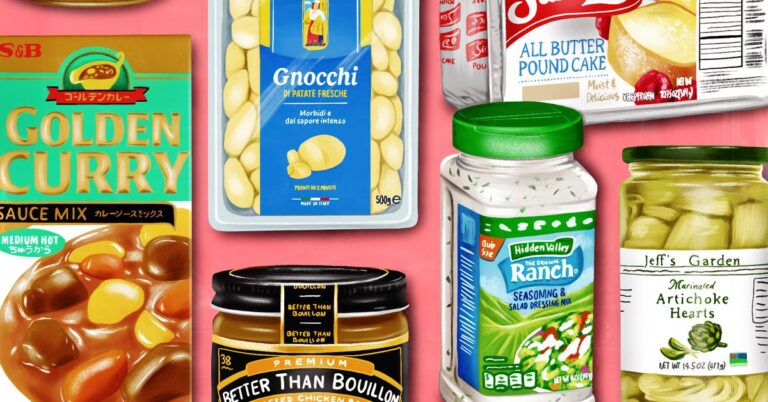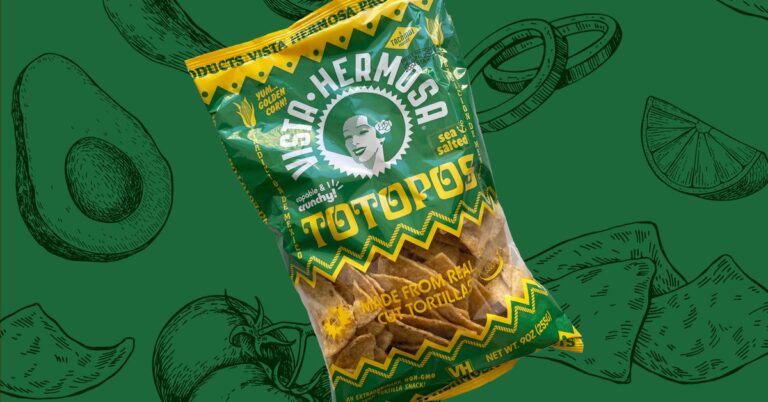For 15 Years, East Bay Company the Xocolate Bar Has Carved a Path Against the Odds
Malena Lopez-Maggi, founder and owner of Berkeley’s the Xocolate Bar, first encountered the parable of the lobster while scrolling social media. Rather than molting its shell with ease and growing a new one as the seasons change, the crustacean swells and swells inside the same shell until the discomfort becomes too great — its shell pops off. Only then is the lobster able to really expand. “This is the Xocolate Bar,” Lopez-Maggi says. “We are the lobster. Compared to 10 years ago, we’re doing seven or eight times the volume. In the same building. We’re at a bursting point.”
Despite having been in business for 15 years, Lopez-Maggi says the Xocolate Bar still barely gets by, scraping from high-volume holiday to high-volume holiday on thin profits. Every year she wonders if she’ll make it to Valentine’s Day, she says, then again she questions if the February boost will be enough to get her to Christmas. Finding a way to make a sustainable path as a woman in the chocolate industry is as hard as it ever has been, Lopez-Maggi says, though these days there are a few new ways to thread the needle.
:no_upscale()/cdn.vox-cdn.com/uploads/chorus_asset/file/23377077/IMG_1605.JPG)
Long before she began her foray into the chocolate industry, Lopez-Maggi worked in a metalsmithing studio while her partner Clive Brown worked with fused glass and ceramics. The couple was always looking for new materials to mold, and while exhibiting at the KPFA Craft Fair in 2005, they saw artisan chocolate for the first time. The possibilities of painting with edible minerals, sculpting molten chocolate, and alchemizing flavors had them both hooked from the beginning.
“We were enamored with the idea of this multisensory sculpture material,” Lopez-Maggi says. “We didn’t know anything about the technical parts of handling chocolates. We went with our gut, rather than how the bonbons or pralines were historically made.” Most of the recipes they came up with ended up being vegan. Neither Lopez-Maggi nor Brown are strictly plant-eaters, but they found that adding milk to the tangy flavor profile they craved created a curdled taste in their chocolates. So they left the dairy out, a move that was decidedly ahead of its time.
Back in 2006, when it was still uncool to call chocolate “plant-based,” Lopez-Maggi rented her first commercial kitchen for the Xocolate Bar in the Presidio Yacht Club from a landlord, who happened to manage the club. Since it was a shared kitchen, the young company found it tough to find space; strong smells or burners too close to the chocolate could impact the final product. “We’d work these ridiculously long days from eight in the morning to two in the morning to get the batch just right,” Lopez-Maggi says.
As things became untenable, they found a bigger location to lease. The investment made sense; the space allowed them to put production in the back, with a tiny store out front. In 2008, they opened their doors in Berkeley; the opening happened to fall the same week the stock market came apart. The small shop clutched to stay open, relying on word-of-mouth rather than advertising. “We hung on and grew slowly over the years,” Lopez-Maggi says.
With a rooted location, Lopez-Maggi says she was ready to grow the business, but she began to feel financially restricted, like doors just weren’t opening for her, she says. She’d gone through bankruptcy years prior, carried student debt, and says she’s been denied business loans, lines of credit, and a mortgage. “We didn’t have ‘dad’s farm’ to set a loan against,” Lopez-Maggi says. “It’s not directly because I am a woman of color, but because I am in an economic position that is common among women of color.”
Margins on chocolate are notoriously low, as they are for all food ventures, so securing financing to grow the Xocolate Bar has continued to be a struggle over the years, Lopez-Maggi says. But new financing options — ones outside of traditional bank loans — have recently begun to provide opportunities for small businesses like the Xocolate Bar. Lopez-Maggi just took out a loan from microfinance outfit Kiva, plus a loan from a bank, and launched a GoFundMe to raise funds for upgraded chocolate equipment. “We can’t be working on two 10-pound tempering machines anymore,” Lopez-Maggi says. “Our fridge is 25 years old, which is ridiculous.”
:no_upscale()/cdn.vox-cdn.com/uploads/chorus_asset/file/23377080/IMG_1766.JPG)
She’s not the only business owner looking to overcome barriers to financing through nontraditional funding sources. In recent months, Yuka Ioroi’s Cassava restaurant in the Richmond District of San Francisco and Raul Medinas’ Venganza Foods in Oakland used WeFunder, an online crowdfunding service, to raise the money needed to reach their financial goals. In Oakland Reesa Kashuk’s Poppy Bagels found SMBX to be an appealing alternative to traditional fundraising, and GW “Chef” Chew of Something Better Foods looked to financial firm Runway Project for support.
But limited access to capital isn’t the only thing Lopez-Maggi says has kept her from growing her business faster. “I know many women who can’t scale up like our male counterparts,” Lopez-Maggi says. “It’s the intersection of intergenerational wealth and privilege in the equation.”
Wendy Lieu from Socola Chocolatier, which she and her sister have run since 2001, can relate to feeling like the cards are stacked against her as a woman entrepreneur. She and her sister launched at a farmers market in Santa Rosa when Lieu was 19 years old and her sister, Susan, was 16. They sold their products outside their parents’ nail salon. The business name is Vietnamese, so curious customers would ask if the sisters were selling Vietnamese chocolate; Lieu would tell them no, just that she and her sister were Vietnamese American. “Everyone else [in the industry] was male and mostly white,” Wendy says. “Plus we were two teenage sisters starting their own business. We had a lot to prove because we were young, we were not male and European, and not classically trained.”
Mindy Fong, owner and founder of Jade Chocolates, cites Scharffen Berger Chocolate Maker’s explosive popularity in Berkeley around 2007 for her getting into the chocolate game. The success of that company, which was later acquired by Hershey, forecasted where chocolate was going in Fong’s mind. But unlike Scharffen Berger, which was founded by a vintner, Fong’s business — which often highlights flavors common to Filipino and Chinese Americans such as mango, rice, and various teas — was once ridiculed by a customer for its “esoteric flavors,” she recalls. “It was a little bit shocking,” Fong says. “I’m looking at him thinking, how can you think this way?”
Still, Lieu doesn’t want to give the impression she’s bitter. She eventually realized it was an advantage to feature less-common flavors and then began to wonder why Vietnamese coffee couldn’t be a flavor for chocolate, or guava, or durian. There were no Asian, woman, or Vietnamese chocolatiers that she knew of in Sonoma, the county where she started the business. “The landscape has changed in the last 20 years and it has been exciting to see more representation from women and people of color in the chocolate industry,” Lieu says. “I feel proud to have been part of the movement for diversity.”
:no_upscale()/cdn.vox-cdn.com/uploads/chorus_asset/file/23385274/resaved.jpeg)
In 2020, the Xocolate Bar shop shut down to customers due to the pandemic and pivoted to online sales, which the company had never offered before; shipping always seemed like too much work. Now the Solano Avenue shop resembles a mini-warehouse with packages stacked floor to ceiling. The team stands in what used to be the retail space, among the mountains of cardboard boxes, madly wrapping packages in tape. It was the only option to stay afloat, Lopez-Maggi says, and helped spur the business in a new direction. “We were busier than ever before,” Lopez-Maggi says. Faire, a Bay Area-based tech company like Etsy for wholesalers, was a big boon. “Volume has quadrupled since before the pandemic,” Lopez-Maggi says. “It’s this Tetris puzzle of how to maximize space. It’s constant.”
Things may be looking up, but scaling up provides the same challenges as ever; finding an affordable location to grow into will be a challenge, Lopez-Maggi says. This brings her back to the parable of the lobster: Her business is still growing, but the constraints of economic and cultural pressures seem to continually close in. Any day now, though, Lopez-Maggi is betting the weight of it is bound to crack. “We’re slowly, slowly growing,” she says.





